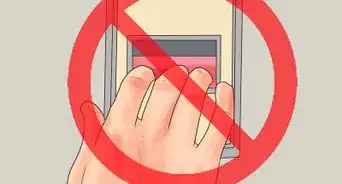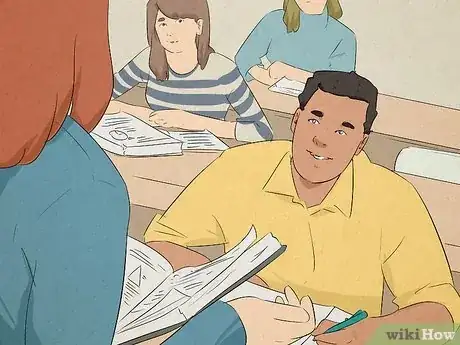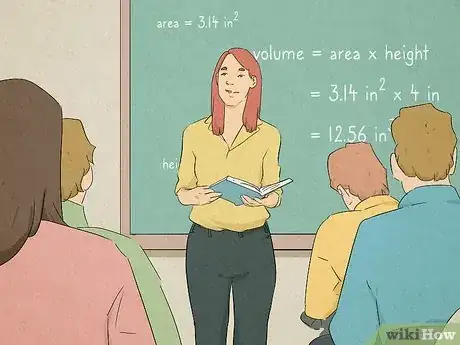This article was co-authored by wikiHow staff writer, Dan Hickey. Dan Hickey is a Writer and Humorist based in Chicago, Illinois. He has published pieces on a variety of online satire sites and has been a member of the wikiHow team since 2022. A former teaching artist at a community music school, Dan enjoys helping people learn new skills they never thought they could master. He graduated with a BM in Clarinet Performance from DePauw University in 2015 and an MM from DePaul University in 2017.
There are 10 references cited in this article, which can be found at the bottom of the page.
This article has been viewed 4,677 times.
Learn more...
Geometry is a standard course in high school math curriculums, but many students feel ready to take more advanced classes—is there any way to skip it? The rules and recommendations vary by state, school district, and your graduation requirements. That’s a lot to think about, but we’re here to help! Keep reading for a handy list of who to talk to, what to consider, and the options you have if you want to skip Geometry in high school.
Steps
Review your school’s Geometry requirements for graduation.
-
Skip Geometry entirely if it’s not a required graduation credit. Most states require 3 or 4 math credits to graduate high school. Geometry may or may not be one of those required credits—it depends on your state or school district. If it’s not a required course, you’re in the clear as long as you have enough math credits to graduate.[1] X Research source
- Some states require an exit exam with a math component that may contain Geometry. If you skip Geometry, study the basic concepts independently to pass the exam.
Ask your guidance counselor about Geometry alternatives.
-
Your guidance counselor is the ultimate resource for academic planning. Visit your counselor first thing if you want to skip Geometry. They’ll tell you whether it’s an option in your school or not and recommend different classes or alternatives to make sure you get the right math credits to graduate.[2] X Trustworthy Source US Bureau of Labor Statistics U.S. government agency that collects and reports labor-related information Go to source
- Your counselor can tell you what past students in a similar situation have done to give you an idea about what to do or expect when you skip Geometry.
- They’ll make sure you take the right math classes to meet college admission requirements (depending on where you want to go and what degree you want).
- Even if it’s possible to skip Geometry, your counselor may advise against it based on your school’s math curriculum or your college interests.
Test out of Geometry if it's required for graduation.
-
Testing out means you get a Geometry credit without taking the class. The rules for this vary by state and school. Generally, you’ll take an exam (or multiple) to demonstrate you know the class content well enough to skip. Make extra sure that you still earn credit for the class if you test out since this isn't always the case.[3] X Research source
- Learn the class material on your own if you want to test out. Study from your school’s Geometry textbook if possible, or use online and tutoring resources.
- The testing-out exam might be similar to the final exam for the class, or it might be a different assessment put together by your school’s math department.
Earn Geometry credit outside of your high school.
-
If you take an accredited Geometry class outside school, you can skip it in school. Check with your counselor to see what approved options you have—online courses, vocational academies, and community colleges that offer Geometry are all possibilities. Treat these classes as seriously as your normal high school classes to earn a good grade (and get that credit!).[4] X Research source
- This is a good option if you’re trying to advance through your school’s math curriculum quickly or don’t have room in your class schedule for Geometry.
Take Geometry in summer school.
-
Summer school Geometry works if skipping or outsourcing aren’t possible. Consider this option if you want to save room in your regular schedule, want to reach higher level math courses sooner, or just want to get Geometry over with as quickly as possible. Remember that summer courses are condensed, so the class might be fast-paced and challenging.[5] X Research source
- Ask your math teacher what the summer class is like and how students perform compared to a regular-length class. Then make a plan to thrive in summer school.
- If the summer class is online, decide whether you’re self-motivated enough to learn independently.
Enroll in community college Geometry for dual credit.
-
Often, you can take a community college course for high school and college credit. This is a great solution if you don’t have room in your high school schedule for Geometry and want to earn some college credit at the same time. Ask your guidance counselor for more information about offerings like this online or in your area.[6] X Research source
- Hang on to your community college transcript. You’ll need it to get Geometry credit at your high school and any colleges you’re applying to.
- These types of classes and credits are often called dual enrollment programs.
Take Geometry at the same time as another math course.
-
Concurrent math classes help you reach higher level courses faster. If your motivation for skipping Geometry is to skip ahead to more challenging classes before graduating, this is a great option. Take Geometry alongside a related course, like Algebra I or Algebra II, to save time.[7] X Research source
- Consider whether the course load of 2 math classes at once is doable for you. Ask your math teachers or counselor for advice before signing up for this.
- Taking Geometry alongside another math class ensures you get the credit you need to graduate and apply to colleges.
Take advanced classes instead to fulfill your math credits.
-
Most high school math curriculums are sequential and include Geometry. When you take Geometry out, you’ll have to take more advanced courses at the end of the sequence to earn enough math credits to graduate. These might be classes like Pre-Calculus, Calculus, AP Statistics, Trigonometry, or Computer Science.[8] X Research source
- Double check if Geometry is a prerequisite for higher level classes—if it is, you’ll need to earn a course credit elsewhere instead of skipping.
Ask your math teacher for their opinion or recommendation.
-
A math teacher can explain how skipping Geometry affects other math courses. If you skip it entirely or take a condensed summer school course, you might miss out on skills or concepts important to the following classes. Ask your math teacher how past students have fared after skipping Geometry and what they recommend.[9] X Research source
- Your math teacher might suggest summer school Geometry or a course at an outside learning program so you still learn the material.
Get your parents on board.
-
Your parents can support you while you meet with teachers and make a plan. Ask them to come with you to meetings, or to call or email a teacher on your behalf if you’re not sure how to approach the subject yourself. In some cases, you’ll need parental permission to make a big course change, especially if Geometry is usually required.[10] X Research source
- If your counselor or teachers don’t support skipping Geometry, your parents can help you meet with other administrators or school board members.
- If you opt to pursue Geometry at home, online, or at a learning center, your parents can help keep you focused or transport you to your new class.
You Might Also Like
 28 Best Excuses for Getting Out of School
28 Best Excuses for Getting Out of School













References
- ↑ https://nces.ed.gov/programs/digest/d20/tables/dt20_234.30.asp
- ↑ https://www.bls.gov/ooh/community-and-social-service/school-and-career-counselors.htm#tab-2
- ↑ https://tea.texas.gov/academics/learning-support-and-programs/credit-by-examination
- ↑ https://www.theclassroom.com/high-school-credits-online-5959772.html
- ↑ https://blog.agradeahead.com/post/should-your-child-take-geo-this-summer/
- ↑ https://www.accreditedschoolsonline.org/resources/high-school-dual-enrollment/
- ↑ https://www.westfordk12.us/wa/mathematics-and-computer-science-department/faq/do-i-need-double-math-classes
- ↑ https://www.niu.edu/mathmatters/course-planning/index.shtml
- ↑ https://blog.agradeahead.com/post/should-your-child-take-geo-this-summer/
About This Article























































